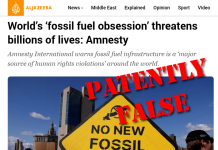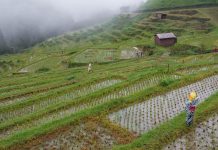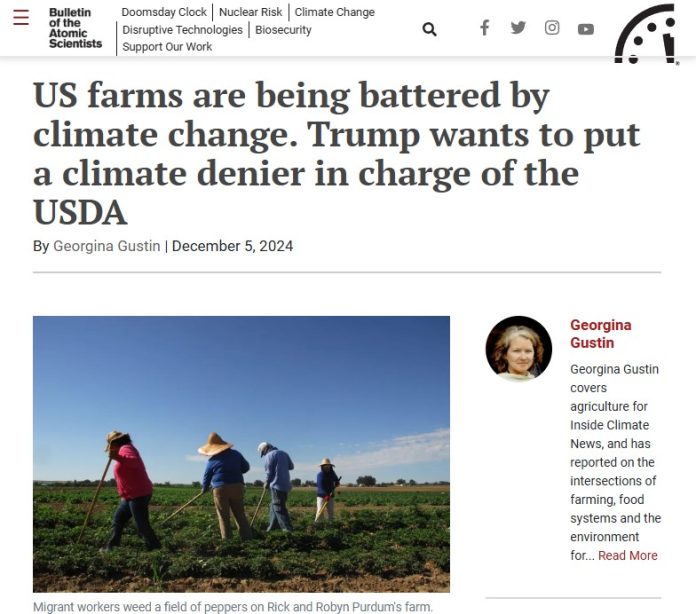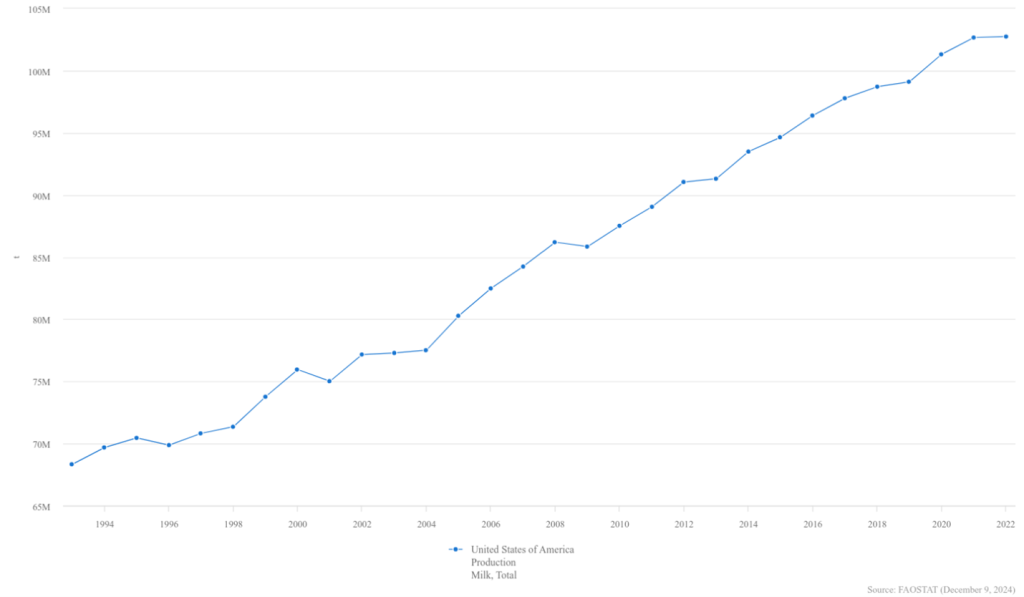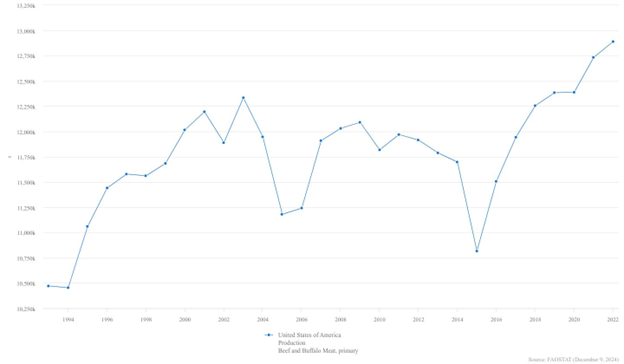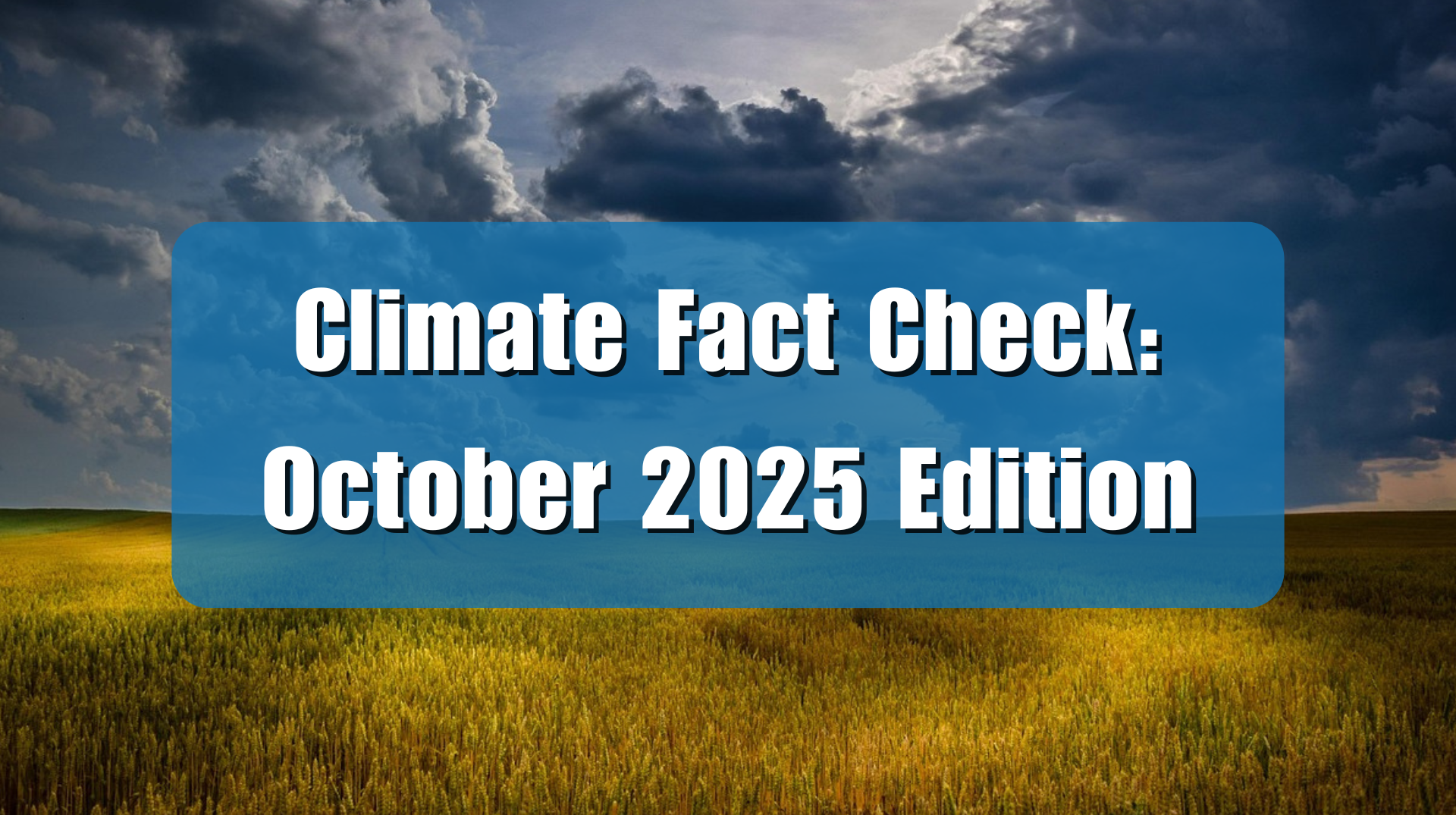The Bulletin of Atomic Scientists reposted an article by Inside Climate News which asserts that American farmers have suffered from climate change over the past eight years and, as a result, have become less skeptical that the world is in the midst of a climate crisis. This is false. Facts show that weather disasters aren’t increasing amid climate change, nor has farm production declined. If farmers and the lobbying organizations appear less skeptical than they have been in the past that dangerous climate change is happening requiring government relief, it is likely due to the huge federal subsidies that have flowed to farms from the federal government in its futile effort to control the weather.
In the article, titled, “US farms are being battered by climate change. Trump wants to put a climate denier in charge of the USDA,” Georgina Gustin of Inside Climate News warns that a climate skeptic, Brooke Rollins, President-elect Trump’s nominee to head the U.S. Department of Agriculture (DOA), may reduce federal largesse for agricultural climate programs, money farmers have come to enjoy and expect.
Inside Climate News is decrying Rollins candidacy because she is a climate realist. Rollins has both a law degree and a degree in agricultural development, and served as the Director of the Domestic Policy Council during Trump’s first term, so she is well qualified to run the DOA. Rollins knows both the challenges facing farmers and the ins and outs of the regulations and laws governing agriculture policy. Rather than being an unknown, as Inside Climate News implies, Rollins views on climate change and climate policy are well known. She has previously spoken The Heartland Institute’s America First Energy Conference, and is on record as supporting withdrawing from the Paris Climate Agreement and ending the Obama administration’s disastrous Clean Power Plan.
In fact, as Rollins is well aware, data and research presented at both Climate Realism and Climate at a Glance clearly demonstrate, contrary to false media reports, weather hasn’t become more extreme so farmers haven’t faced worsening growing and harvesting conditions over the past eight years, or the past thirty for that matter.
During the past 30-year period over which climate change is measured, between 1993 and 2022 (the last year with available data), the U.N. Food and Agriculture Organization reports that America’s dairy farmers have seen their production increase by more than 50 percent, with the most recent record production occurring in 2022. (see the figure below)
Over the same time period, cattle ranchers have also seen a 23 percent increase in production, setting new records for production each year since 2018. (See the figure, below)
Lest one is concerned, the U.N reports that U.S. crop production has done well over the past 30 years as well. Cereals, fruits, roots and tubers, and vegetables have all experienced production that exceeded almost every year’s production prior to Trump’s previous presidential term, refuting the impression of struggling farmers given in Inside Climate News’ story
It’s not changing weather patterns or lost production that is worrying farmers, it’s the fact that Rollins supports President Trump’s goal of cutting government waste, particularly costly, non-sensical, and futile climate spending, that has put Inside Climate News and some farmers and farm groups in a tizzy.
Under the Biden/Harris administration, harvesting climate subsidies has become a lucrative sideline for many farmers, as Inside Climate News writes:
In the eight years since the last Trump administration began, American farms have been repeatedly battered by extreme weather, requiring the USDA to direct tens of billions of dollars in disaster relief and crop insurance payouts to the country’s farmers.
“Many more farmers have had their eyes opened to the threat of climate change,” Karen Perry Stillerman, deputy director of the food and environment program at the Union of Concerned Scientists, told Inside Climate News. “Many more farmers have benefited from these giant investments in farming and conservation, and have gotten some incentives and support to shift their practices. That may be harder than people think to wind back.”
Also during those years, the most powerful agricultural lobby group, the American Farm Bureau Federation, shifted its position on climate change, influencing conversations in farm country. The group had long denied the scientific consensus that human activity is driving greenhouse gas emissions, but has since softened its denial as funding for climate-focused programs has flowed to farmers and as carbon markets, based on carbon storing-farming practices, have promised the potential of revenue to its members. [emphasis authors]
So far, farms and farmers have received roughly $7 billion to help them implement “climate smart” farming practices under the Biden administration’s signature climate legislation, the Inflation Reduction Act. Another $13 billion or so is still on the way, though Congress’ efforts to pass a Farm Bill, which would direct those funds in coming years, are stalled. Republican versions of the legislation call for removing the requirement that the funding support climate-specific practices.
The USDA is investing another $3 billion in climate-focused agricultural practices under the agency’s Partnership for Climate Smart Commodities.
Twenty-three billion dollars or more of climate agriculture funding provides a powerful incentive for farmers and the organizations that lobby on their behalf to eschew climate skepticism and embrace alarm and all the federal money that comes with jumping on the bandwagon.
In the end, the weather is not getting worse and agricultural production is doing fine. Farming has always been a precarious profession, beset by the seasonal and annual vagaries of weather. There is no evidence that climate change is making farming harder than it has always been. The incoming Trump administration has promised to cut government waste, and based on the evidence, climate subsidies for farmers are unjustified and thus one good place to begin.







